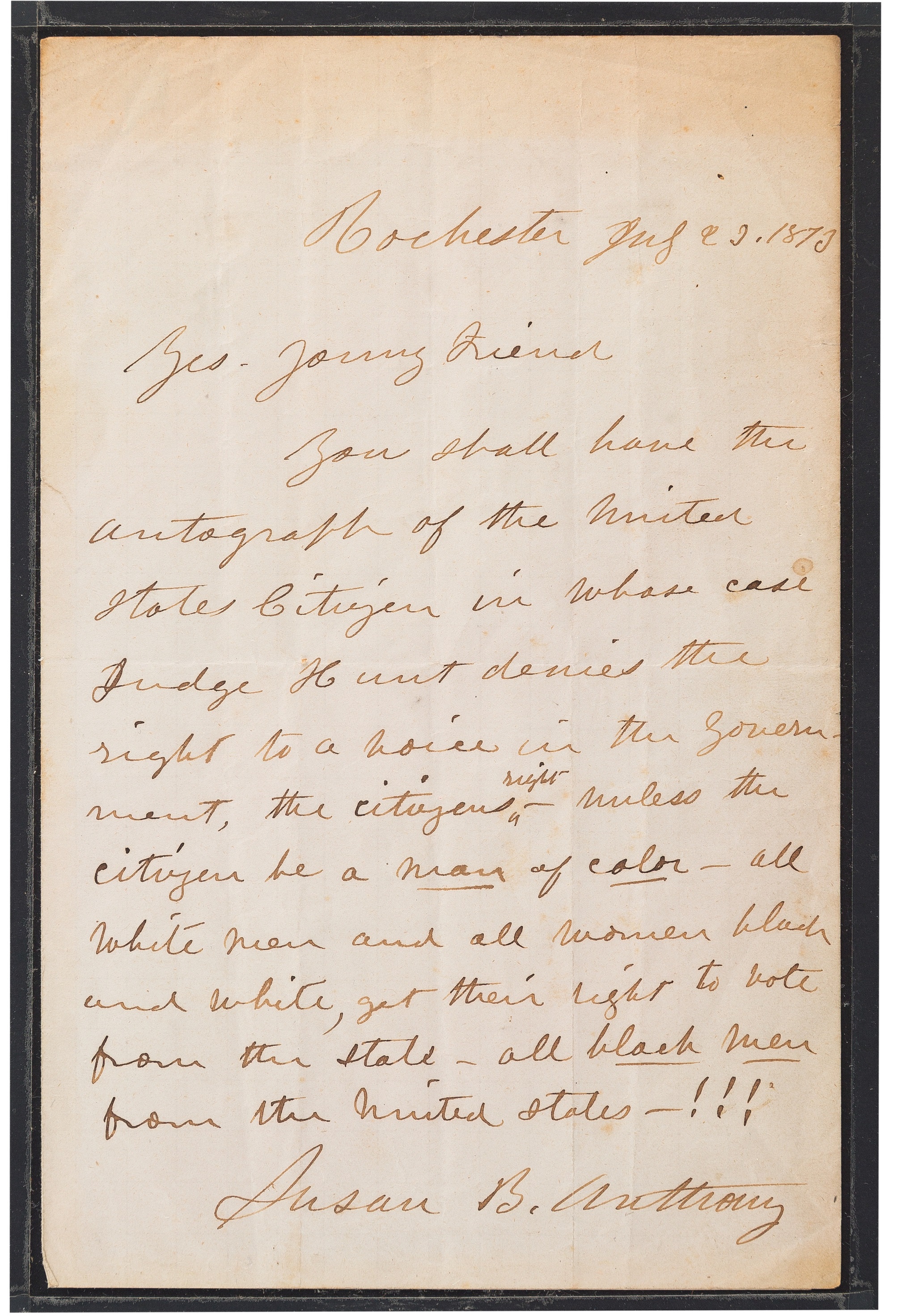
By Jim O’Neal
On Nov. 5, 1872, Susan B. Anthony wrote to Elizabeth Cady Stanton: “Well, I have been & gone & done it!! – positively voted the Republican ticket – strait [sic] – this a.m. at 7 o’clock.”
Anthony had cast her ballot at a barbershop in Rochester, N.Y. She was one of 6,431,149 citizens who voted in the election between Ulysses S. Grant and Horace Greeley, an election Grant won decisively by more than 760,000 votes. Three weeks later, on Thanksgiving Day, Anthony and a handful of other women who voted with her were arrested and indicted for having “knowingly voted without having a lawful right to vote.”
The verdict at her trial was a forgone conclusion. The judge refused to let her take the witness stand and then instructed the all-male jury to find her guilty without any deliberation. Anthony succeeded in being heard, however, when the judge asked if she “had anything to say why sentence shall not be pronounced?” She quickly replied,
“Yes, your honor, I have many things to say, for in your ordered verdict of guilty, you have trampled underfoot every vital principle of our government. My natural rights, my civil rights, my political rights are all alike ignored. Robbed of the fundamental privilege of citizenship, I am degraded from the status of a citizen to that of a subject … doomed to political subjection.”

She then refused to pay the $100 fine the judge ordered, but he refused to imprison her, thereby preventing her from appealing to a higher court. Undeterred, Anthony took her case to the public and had thousands of copies of the trial proceedings printed and widely distributed.
Susan B. Anthony would find other ways to relentlessly press the cause of women’s suffrage. Brought up as a Quaker and active as an early supporter of temperance, she soon realized that until women could vote, politicians would not pay any attention to them. For more than 50 years, she urged lawmakers to enfranchise the other half of America’s citizens. She attended her first women’s rights convention in Syracuse, in 1852, and with Elizabeth Cady Stanton founded the American Equal Rights Association in 1866. The two women published a feisty newspaper, The Revolution, whose masthead proclaimed “Men their rights and nothing more; women, their rights and nothing less.”
She appeared before every U.S. Congress between 1869 and 1906 to ask them to pass a Suffrage amendment. She was prepared as any modern-day lobbyist – her copy of the seating chart for all members of Congress has survived. Her speech to a Senate Committee in 1904 reflected her frustration: “I never come here, and this is the seventeenth Congress I have attended, but with the feeling of injustice which ought not to be borne, because the women, one-half the people, are not able to get a hearing from the Representatives and Senators of the United States.”
Her combative tone did not mellow with age. When President Theodore Roosevelt sent congratulations in 1906 for her 86th birthday celebration, her response was indignant: “I wish the men would do something besides extend congratulations … I would rather have him say a word to Congress for the cause than to praise me endlessly.”
She ended that evening’s gathering, her final public appearance, with a ringing prophecy: “There have been others also just as true and devoted to the cause … but with such women consecrating their lives, failure is impossible!”
Less than a month later, on March 13, 1906, she died at her home in Rochester, N.Y. The rights for which she had worked so tirelessly were finally won when the Nineteenth Amendment, the “Susan B. Anthony Amendment,” passed on June 4, 1919, as women stood on the steps of the Capitol to cheer. The vote was close, only one more than the required two-thirds. To enable the passage, two Congressmen had come from hospitals to vote aye; a third left his suffragist wife’s deathbed to cast a vote, then returned for her funeral. When the State of Tennessee became the 36th state to ratify, the amendment was officially adopted on Aug. 18, 1920 – nearly half a century after Susan B. Anthony had illegally voted for Ulysses S. Grant.
A life. A cause. Finally accomplished.
 Intelligent Collector blogger JIM O’NEAL is an avid collector and history buff. He is president and CEO of Frito-Lay International [retired] and earlier served as chair and CEO of PepsiCo Restaurants International [KFC Pizza Hut and Taco Bell].
Intelligent Collector blogger JIM O’NEAL is an avid collector and history buff. He is president and CEO of Frito-Lay International [retired] and earlier served as chair and CEO of PepsiCo Restaurants International [KFC Pizza Hut and Taco Bell].
